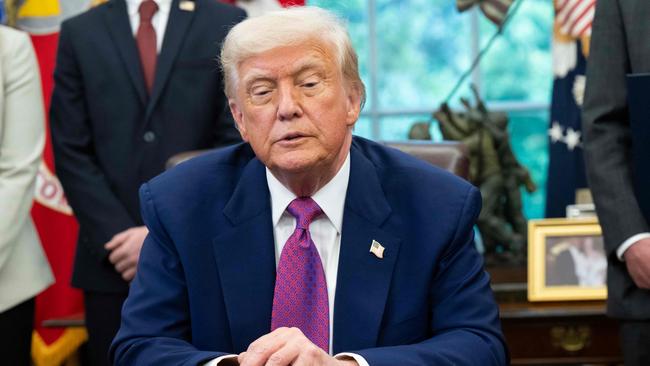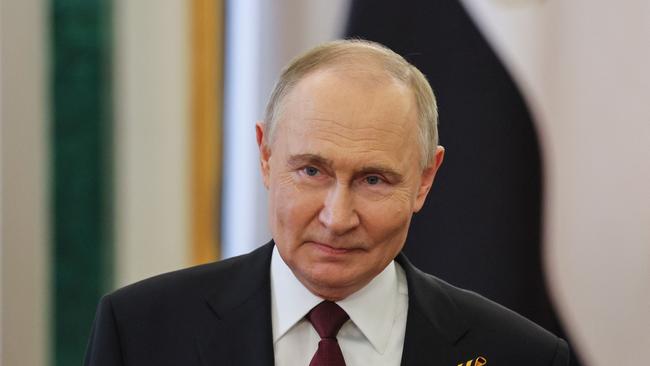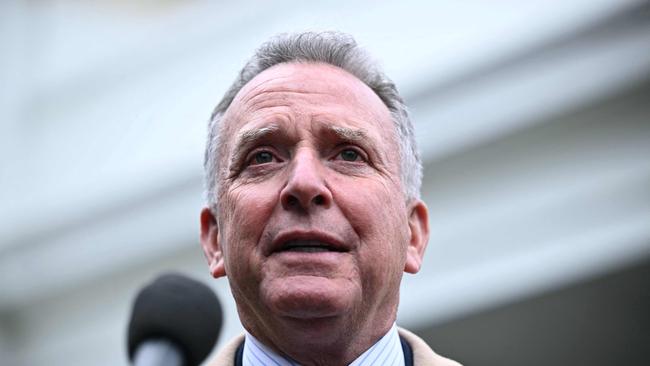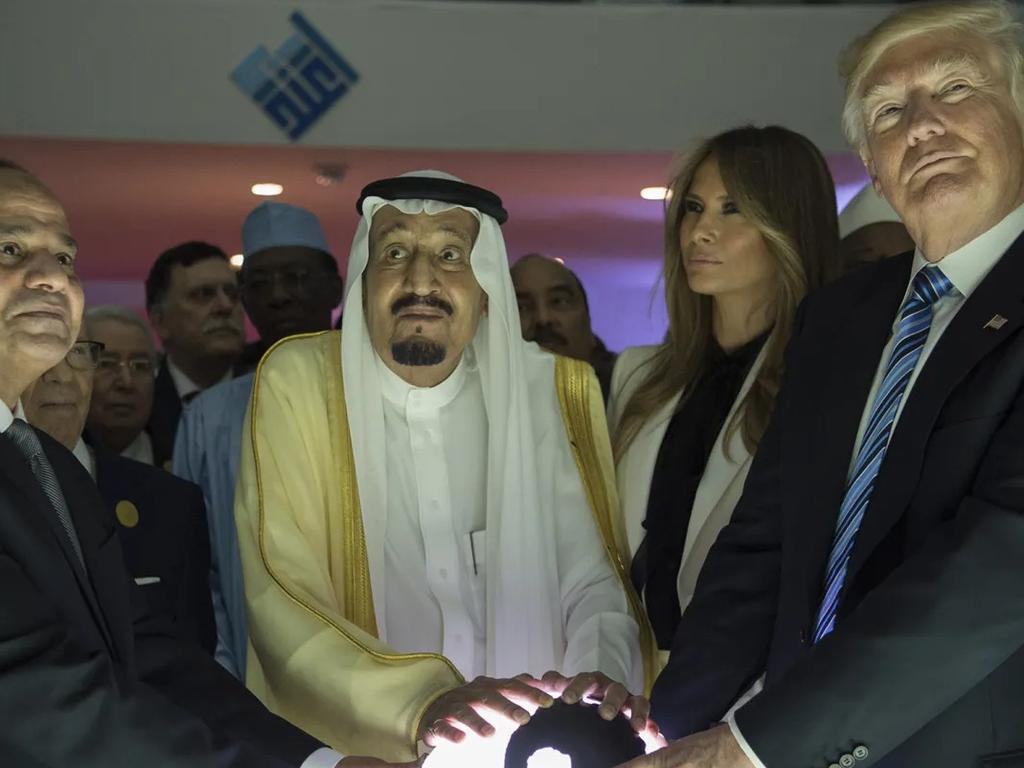Trump promised to end two wars quickly – in private, he admits he’s frustrated
The president has told donors resolving the conflicts has been more difficult than he thought.

When President Trump spoke to a room of top donors at his Florida club last week, he described ending Russia’s war in Ukraine as a growing frustration that keeps him up at night, people in the room said.
Russian President Vladimir Putin was particularly tough to negotiate with, and wanted “the whole thing,” Trump said, referring to Ukraine, according to an attendee. His comments came in response to a donor’s question about his biggest foreign-policy concerns.
The war in Gaza was also notably challenging, Trump told the crowd. Finding any solution was hard because “they’d been fighting for a thousand years,” he said.
When Trump campaigned to return to power, he vowed to end both of those wars diplomatically and argued that neither conflict would have begun if he was in the White House at the time. He would even end the war in Ukraine on “on day one,” he said.
Instead, as he passes the 100-day mark of his second term with neither conflict closer to a resolution, negotiations to end Iran’s nuclear program stalled, and a trade war straining relationships with allies, Trump is finding solving the world’s problems more difficult than he had thought.
“Bluster and theatrics have their role in diplomatic high wire acts, but so do details and hard work,” said Dan Baer, a former ambassador in the Obama administration who is now at the Carnegie Endowment for International Peace in Washington.

Trump has since said he was joking about ending the Russia-Ukraine war in record time, and that supporters know he was being hyperbolic.
Kyle Haynes, a professor of US foreign policy at Purdue University, said: “If he hadn’t promised such things repeatedly throughout the campaign it’d be wildly unfair to criticise him for failing to achieve them. But he did.”
White House spokeswoman Anna Kelly said Trump and his team had been “laser-focused on delivering peace around the world and stopping bad actors from doing harm to Americans and our allies.”
“Their approach has been successful — Houthis agreed to a ceasefire, 47 Americans detained abroad have come home, NATO countries are increasing defence spending, China is deterred, and we are closer to peace in the Russia-Ukraine War than ever before,” she said.
Too many asks
In recent weeks, Trump has privately griped to advisers that Putin doesn’t want to end the war, and that both sides refuse to compromise. Trump has also asked advisers if they believe Putin has changed since Trump’s last time in office, and expressed surprise at some of Putin’s military moves, including bombing areas with children, according to people familiar with the remarks.
Earlier this year, Trump said he believed Kyiv would be harder to convince than Russia unless the deal terms were Ukraine’s terms, resulting in a combative Oval Office encounter with Ukrainian President Volodymyr Zelensky live on television.
More recently, senior Trump administration officials have acknowledged that Russia remains the biggest holdout, refusing to agree to an unconditional 30-day ceasefire that Kyiv has already supported and instead seeking more concessions from Ukraine.

“I wouldn’t say that the Russians are uninterested” in ending the conflict, Vice President JD Vance told a Munich Security Forum event in Washington on Wednesday. “We think they’re asking for too much.”
Trump’s early plans for the conflict were also up-ended within weeks. Russia complained about Trump’s first Ukraine envoy, Keith Kellogg, over the retired general’s daughter’s support for Kyiv.
Trump then told Kellogg only to talk with the Ukrainians, and tapped Steve Witkoff, his longtime friend serving as the Middle East envoy, to step in. Kellogg and his team have argued that the diplomat has been effective in getting Kyiv to buy into Trump’s peace process.
Witkoff has repeatedly pressed both sides to accept some terms they don’t like. Now, Witkoff has told others he just wants to get the two sides to the table, which he hasn’t yet been able to do.
Other US officials have also suggested Trump may consider his job done if he gets the Russians and Ukrainians to engage in serious direct negotiations. What happens after that would be up to them, allowing the US to focus on other priorities, the officials said.
‘Trying their best’
On Gaza, too, the Trump administration is pushing for a negotiated end to the war between Israel and Hamas.
Witkoff helped the departing Biden administration execute its ceasefire plan in January, just moments before Trump took office. But that agreement crumbled in March, and now the war has resumed. Israel has stopped all aid from reaching vulnerable Palestinians in Gaza, sparking a deepening humanitarian crisis.

Israel’s cabinet this week approved a measure to capture all of Gaza should Hamas keep on fighting and hold the remaining hostages. The Israeli government said Hamas has until the end of Trump’s Middle East visit next week to release the hostages.
Some administration officials have been frustrated by Israel’s renewed attacks. But Trump has continued to talk about rebuilding the area, and effectively given Israel the green light to continue its military operations until Hamas changes course.

Meanwhile, Witkoff has widened his net of advisers to prepare for a post-war Gaza, including meeting with former British Prime Minister Tony Blair and lawyer Alan Dershowitz, according to people familiar with the matter.
“Whether they’ll succeed remains to be seen, but they’re trying their best,” Dershowitz, a former Harvard professor said, adding: “I sense it’s more challenging than they hoped.”
‘Total dismantlement’
The Trump administration’s position on Iran’s nuclear program has also been mixed and sparked significant internal debate, administration officials say.
Trump says the nuclear talks with Iran are going well. Witkoff has met indirectly three times with Iranian counterparts about curbing Tehran’s nuclear development, and is expected to hold a fourth meeting in Oman this weekend.
Witkoff has proposed that the US would lift sanctions and take military action off the table if Iran agreed to dismantle its nuclear program and purchase enriched uranium from the US. So far, Iran has sought to keep its centrifuges, and shown no sign of dismantling any of its nuclear work. There is also no firm US position on what dismantlement looks like.
“We haven’t made that decision yet,” Trump told reporters Wednesday, after telling NBC News days earlier that “total dismantlement” was all he would accept. Trump administration officials have been surprised at the amount of criticism from Republicans on the topic.
Trump has threatened military action against Iran if it refuses strict limits on its nuclear work, but has yet to convince most other allies.
France’s foreign minister, Jean-Noël Barrot, said in an interview that France and others need tougher measures against Tehran than the 2015 nuclear deal that Trump exited, but ruled out a military option.
“We believe there is no other path towards a resolution of the Iranian problem than a diplomatic path,” he said.
Wall Street Journal





To join the conversation, please log in. Don't have an account? Register
Join the conversation, you are commenting as Logout